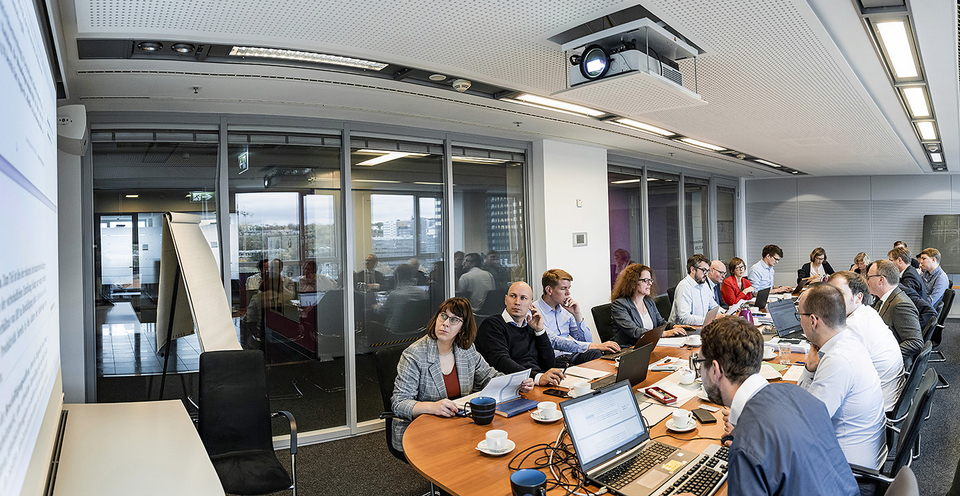HOW IS THE ANNUAL REPORT COMPOSED?
The German Council of Economic Experts’ task is to observe and describe the economic development in Germany. According to its legal mandate, the GCEE analyses the economic situation and its foreseeable development. It also points out undesirable developments and states possibilities for avoiding or eliminating them. The GCEE has the legal obligation to publish an annual report in the first half of November every year. In addition, comments and special reports are published at irregular intervals. The latter are prepared when undesirable developments arise that pose a threat to the economy or when such a report is requested by the Federal Government.
The preparations for the annual report stretch across the whole year. At the beginning of the year, the topics for the upcoming annual report are roughly defined. In accordance with the legal mandate, these are topics that have a macroeconomic significance, represent a challenge for economic policy or in which the GCEE identifies an undesirable development. The selected topics need to remain relevant until the publication of the report and beyond. In addition, further topics may be included in the course of the year due to current developments. The GCEE is obliged to comment on a set of topics every year. These are economic development and productivity. The chapter in the annual report on productivity is simultaneously the annual productivity report, which the GCEE publishes as the National Productivity Board of Germany. The distribution of wealth and income is also a topic which is examined in detail at least every two years as part of the report.
Throughout the year, and especially in the first half of the year, various institutions and scientists are consulted on various topics. Supported by the scientific staff, the GCEE also conducts empirical studies and analyses in the first half of the year. These analyses are based on a variety of data sources including data from our own surveys. All data used for figures and tables in the annual report are published by the GCEE on its website with the annual reports - unless this is not allowed for data protection reasons.
For certain issues, so-called expert opinions can be commissioned to other scientists who are particularly knowledgeable in a certain field, for example in economics or law. In the reports preface, all institutions and persons are mentioned with whom the GCEE has discussed during the year, who have written an expert opinion for the GCEE or who have provided specific data.
Starting in summer of each year, the texts for the individual chapters of the report are drafted. All texts are based on current theoretical and applied literature showing the state of the science. Supported by the scientific staff and its analyses, the contents of the annual report including the economic policy conclusions are phrased on this basis. In autumn, the various drafts are discussed intensively in weekly Council meetings. This produces the Council's opinion, which is reflected in the texts. In addition to the main text, i.e. the Council's opinion, which represents the opinion of a majority of the Council, the GCEE publishes dissenting opinions among Council members, thus reflecting the multitude of economic policy views.
Once the text has been finalised, everything is carefully checked once again and the annual report is printed, the publication and the English translation are prepared. The German version is always published on the GCEE' website at the same time as it is handed over to the German government. The English version is published in the following days and weeks, as soon as the translations have been finalised.
After publication and until early into the new year, the annual report is presented in ministries, at economic research institutes, at many universities and universities of applied sciences and similar institutions and intensively discussed with the respective audiences.


